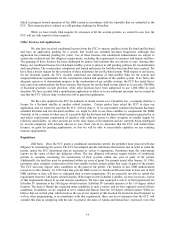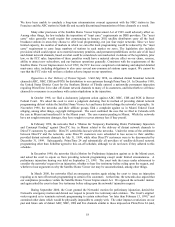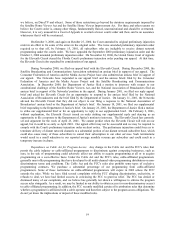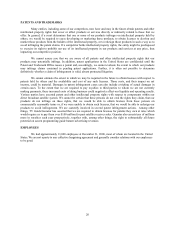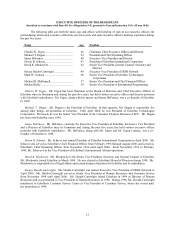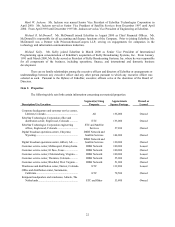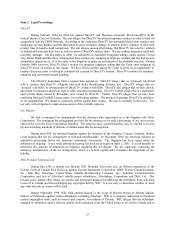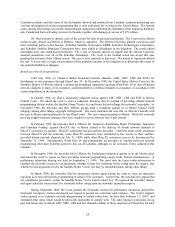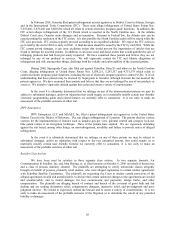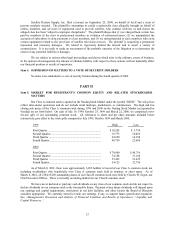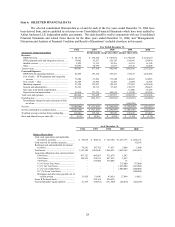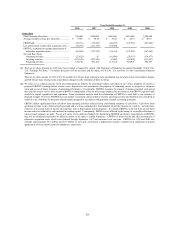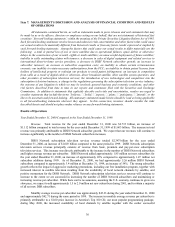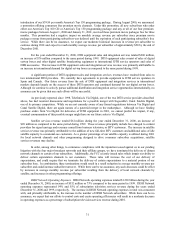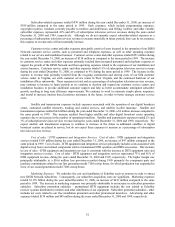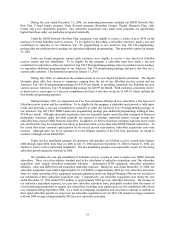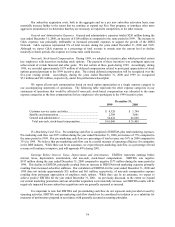Dish Network 2000 Annual Report Download - page 26
Download and view the complete annual report
Please find page 26 of the 2000 Dish Network annual report below. You can navigate through the pages in the report by either clicking on the pages listed below, or by using the keyword search tool below to find specific information within the annual report.24
Canadian residents and that some of the defendants allowed and profited from Canadian residents purchasing and
viewing subscription television programming that is only authorized for viewing in the United States. The lawsuit
seeks, among other things, an interim and permanent injunction prohibiting the defendants from importing hardware
into Canada and from activating receivers in Canada, together with damages in excess of $175 million.
We filed motions to dismiss each of the actions for lack of personal jurisdiction. The Court in the Alberta
action recently denied our Motion to Dismiss, which we appealed. The Alberta Court also granted a motion to add
more EchoStar parties to the lawsuit. EchoStar Satellite Corporation, EDBS, EchoStar Technologies Corporation,
and EchoStar Satellite Broadcast Corporation have been added as defendants in the litigation. The newly added
defendants have also challenged jurisdiction. The Court of Appeals denied our appeal and the Alberta Court has
asserted jurisdiction over all of the EchoStar defendants. The Court in the Federal action has stayed that case
pending the outcome of the Alberta action. The case is now currently in discovery. We intend to vigorously defend
the suit. It is too early to make an assessment of the probable outcome of the litigation or to determine the extent of
any potential liability or damages.
Broadcast network programming
Until July 1998, we obtained distant broadcast network channels (ABC, NBC, CBS and FOX) for
distribution to our customers through PrimeTime 24. In December 1998, the United States District Court for the
Southern District of Florida entered a nationwide permanent injunction requiring PrimeTime 24 to shut off distant
network channels to many of its customers, and henceforth to sell those channels to consumers in accordance with
certain stipulations in the injunction.
In October 1998, we filed a declaratory judgment action against ABC, NBC, CBS and FOX in Denver
Federal Court. We asked the court to enter a judgment declaring that its method of providing distant network
programming did not violate the Satellite Home Viewer Act and hence did not infringe the networks’ copyrights. In
November 1998, the networks and their affiliate groups filed a complaint against us in Miami Federal Court
alleging, among other things, copyright infringement. The court combined the case that we filed in Colorado with
the case in Miami and transferred it to the Miami court. The case remains pending in Miami. While the networks
have not sought monetary damages, they have sought to recover attorney fees if they prevail.
In February 1999, the networks filed a “Motion for Temporary Restraining Order, Preliminary Injunction
and Contempt Finding” against DirecTV, Inc. in Miami related to the delivery of distant network channels to
DirecTV customers by satellite. DirecTV settled this lawsuit with the networks. Under the terms of the settlement
between DirecTV and the networks, some DirecTV customers were scheduled to lose access to their satellite-
provided distant network channels by July 31, 1999, while other DirecTV customers were to be disconnected by
December 31, 1999. Subsequently, PrimeTime 24 and substantially all providers of satellite-delivered network
programming other than EchoStar agreed to this cut-off schedule, although we do not know if they adhered to this
schedule.
In December 1998, the networks filed a Motion for Preliminary Injunction against us in the Miami court,
and asked the court to enjoin us from providing network programming except under limited circumstances. A
preliminary injunction hearing was held on September 21, 1999. The court took the issues under advisement to
consider the networks’ request for an injunction, whether to hear live testimony before ruling upon the request, and
whether to hear argument on why the Satellite Home Viewer Act may be unconstitutional, among other things.
In March 2000, the networks filed an emergency motion again asking the court to issue an injunction
requiring us to turn off network programming to certain of its customers. At that time, the networks also argued that
our compliance procedures violate the Satellite Home Viewer Improvement Act. We opposed the networks’ motion
and again asked the court to hear live testimony before ruling upon the networks’ injunction request.
During September 2000, the Court granted the Networks’ motion for preliminary injunction, denied the
Network’s emergency motion and denied our request to present live testimony and evidence. The Court’s original
order required us to terminate network programming to certain subscribers “no later than February 15, 1999,” and
contained other dates which would be physically impossible to comply with. The order imposes restrictions on our
past and future sale of distant ABC, NBC, CBS and Fox channels similar to those imposed on PrimeTime 24 (and,


